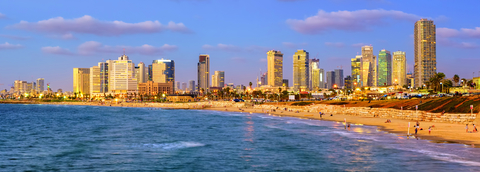The Moral and Religion of The City of Tel Aviv
Tel Aviv is an idea destination for both a quiet trip and for those who like the hustle and bustle. I don't remember how many times I traveled to Tel Aviv but in each of them the city surprises me pleasantly. Every time I go through it again, I feel as if in some other life I had enjoyed this candor from Telavivense that fascinates those who visit it so much.

Gay life in Tel Aviv Tel Aviv stands out from Israel. Because the second city of this country, based on the Jewish religion, is also one of the most gay cities in the world. If in Jerusalem or the Israeli countryside, homosexuality is not always well-known - Judaism prohibits homosexuality, modern Israeli society accepts it better and better, and the rights of gay couples are more and more recognized by the courts.
Political progress Politicians also seem to notice the electoral strength of gays: in 1988, homosexuality is legalized; in November 2006, the Supreme Court ordered the Home Office to register as a "couple" homosexuals who had entered into a marriage abroad: they could therefore enjoy rights in property and inheritance; In February 2008, Israeli justice recognizes the adoption of children by gay or lesbian couples. In 2009, the Knesset grants the right to "paternity leave" for same-sex couples. Finally, in 2014, Israel opened surrogacy (in force since 1996) to same-sex couples. Israel became the one of the most progressive countries in the world and the most tolerant country in the Middle East by guaranteeing homosexuals civil and private rights. Israeli homosexuals can now marry abroad, pacify themselves, adopt children and serve in the army while being protected by anti-discrimination legislation. Gay demonstrations in Israel and Palestine
Tel Aviv is the spearhead of this progressive vision. Due to the general open-mindedness, the Israeli gay community is showing up in gay and gay friendly bars every year, thousands of people march in the streets of Tel Aviv and Jerusalem for Gay Pride. Jerusalem is however much less tolerant than Tel Aviv, and it is better to be a little more discreet. Tel Aviv is, year after year, the scene of the Gay Pride party - with a festival full of nuances and colors - whose last edition was attended by two hundred and fifty thousand people. Everyone wants to live the celebration. The atmosphere of tolerance and respect excels at each festival. During that international event, the inhabitants hang welcome signs in different languages. There are also parties, theme bars and beaches to enjoy the celebration, among other options. Tel Aviv is a gay friendly metropolis that has established itself, in recent years, as the quintessential gay tourist destination.
Religion in the city The problem of the place of religion in the State of Israel is not new. It is posited from the beginning of Zionism. Until the creation of Israel in 1948, three camps had clearly defined positions. The majority of the Zionist movement was secular and wanted a modern, secular state, the religious camp shared the aspiration to a modern state, but wanted that state to give prominence to the Jewish tradition and refused the separation between the state and the state. religion. Finally, camp haredim (which means "the one who fears"), or ultra-religious, was anti-Zionist - according to them, the Jewish state would exist only at the arrival of the Messiah. The State of Israel was born in 1948 on the basis of a compromise between these different perceptions of what the Jewish state should be. Even today, Israelis display very different conceptions of religion and the role it should have in the state.
Different religious practices In Israeli society, categories can be established according to religious practice: lay people (non-practicing, atheist but not necessarily anticlerical), traditionalists (partial religious practice), orthodox (strict religious practice, but immersion in the modern world) and the ultra-Orthodox who, like the Orthodox Jews, strictly practice religion but who, unlike the latter, reject modernity and display a desire for social separatism: specific clothing, specific neighborhoods, specific religious institutions. The case of Haredim or ultra-Orthodox. Until 2014, they enjoyed a special regime that allowed them not to do military service, to continue studying in Talmudic schools (yeshiva). This agreement was due to the fact that they were very few. However, today they account for 10% of the population. This privileged situation, criticized by the majority of Israelis, is challenged by a law passed in the Knesset in March 2014. Since 2017, ultra-Orthodox Jews have taken part in the "national burden" as well. That said, quotas are in place and not all are enrolled. Massive protests shook Jerusalem as ultra-Orthodox Jews accused the state of "religious persecution".
On the Arab side, Palestinians and Israeli Arabs, for their part, have a relative religious unity: they are 90% Muslim, Sunni (rather than Shiite), that is to say attached to the letter, rather than the interpretation , and respect for Shari'a (the law). Of the four Sunni rites, two (Shafi'ite and hanefite) are represented in Palestine.
